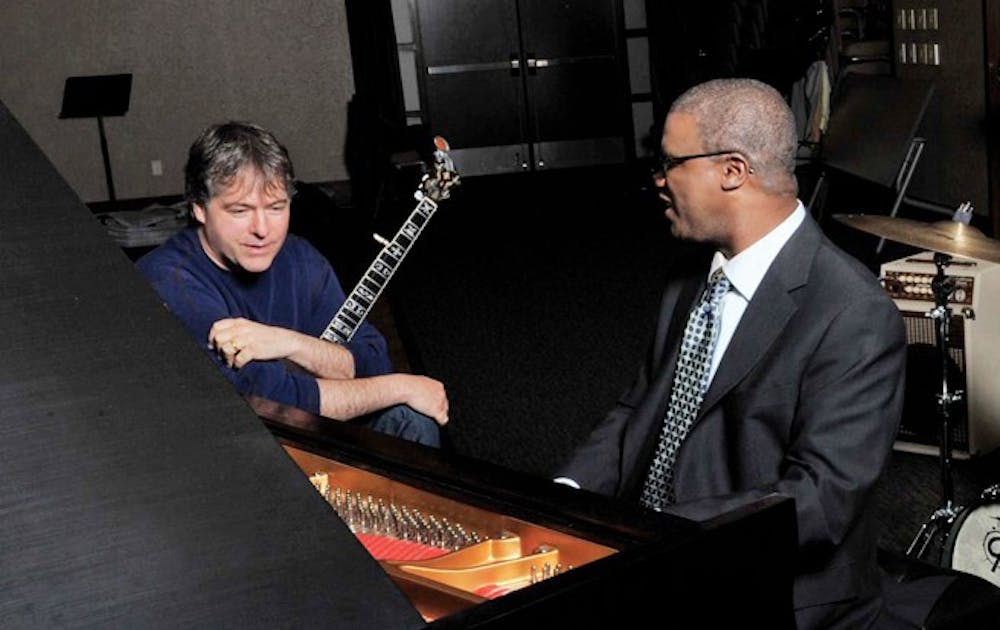Every few decades, a musician gains such enormous skill and reputation as to become nearly synonymous with their instrument. It is hard to talk about the cello without mentioning Yo-Yo Ma. The same can be said of Chris Thile and the mandolin, Edgar Meyer and the upright bass and Zakir Hussain and the tabla. As with many of these figures, Béla Fleck is tied to his instrument—the banjo.
Fleck’s most recent album is a collaboration with the Marcus Roberts Trio, with whom he will perform tonight at the Carolina Theatre. The pair first jammed at the 2009 Savannah Jazz Festival, and, after clicking on stage, they decided to record an album. The result, Across the Imaginary Divide, was released this past June. As its title suggests, the album bridges Roberts’ swing-heavy jazz with Fleck’s innovative banjo music.
According to Barry Poss, founder of Sugarhill Records and Fleck’s long-time friend, Fleck has changed the way we perceive the banjo.
“Béla’s influence is revolutionary,” Poss said. “It’s just enormous.”
Before Fleck came into prominence, the banjo was known mostly as bluegrass, old-time or folk instrument. And while Fleck undoubtedly traces his musical roots to those genres—he studied with bluegrass great Tony Trischka—he has united the banjo with new musical worlds. Perhaps most importantly, he’s exposed new audiences to his instrument. Poss recounted Fleck’s stop in Durham on his first tour with his iconic group Béla Fleck and the Flecktones. They opened for Take 6, a gospel group that sings a cappella.
“So here’s this largely African-American crowd, and this white kid comes on stage with a banjo. You could’ve heard a pin drop in the hall. But then he started playing and he, along with the Wooten brothers (bassist Victor and percussionist Roy)—the audience just exploded.” He continued, “It really was a remarkable accomplishment [that], in such short order, [Fleck took] an audience that was so skeptical of what’s going on [and brought them to] completely embrace him and his music.”
Since Fleck’s career first took off with newgrass royalty New Grass Revival and continued with the Flecktones, he has garnered a reputation as a master collaborator. By making music with masters such as those mentioned above, Fleck has explored genres as diverse as jazz (Chick Corea and Roberts), world (several African traditional string musicians) and classical (a triple-concerto commissioned by the Nashville Symphony with Meyer and Hussain).
Fleck isn’t the first banjoist to explore other musical styles. According to Laurent Dubois, Director of the Center for French & Francophone Studies and author of an upcoming history of the banjo, there is a long tradition of banjo players exploring new musical fields stretching back at least 100 years. But he sees Fleck as the prime ambassador of the banjo among contemporary musicians: “[He satisfies] those who already love the instrument but also [makes] new converts to it.”
While not as well-known as Fleck, the Marcus Roberts Trio deserves as much attention. According to Director of Duke Performances Aaron Greenwald, “Marcus is as much of a monster player and virtuoso as Béla Fleck.” Roberts gained recognition in 1985 when Wynton Marsalis selected him as his sideman, beginning what Greenwald described as a long chain of wonderful pianists in Marsalis’s band. Rounding out the Roberts Trio are bassist Rodney Jordan and drummer Jason Marsalis, the youngest of the famous Marsalis jazz clan.
Like Fleck’s earlier collaborations, his performance with the Marcus Roberts Trio develops a novel aesthetic. Many collaborations throw two different genres together without fundamentally changing the way each instrument is played. Fleck, on the other hand, makes what Greenwald described as “forward music”—music that expands boundaries rather than exploring already-drawn borders. Fleck and the trio could have simply mimicked old forms—like New Orleans jazz—that sometimes feature the banjo. But both Fleck and Roberts donate songs to their joint repertoire, and with every track they tread new musical territory.
Said Roberts in a video feature about the tour, “The record sounds one way, but what will happen when we tour is that every night we will be spontaneously making up many different grooves and perspectives.” Fleck, the master-collaborator, has built his career on that kind of spontaneity, working afresh with people who continue to push him and the limits of the banjo.
Béla Fleck and the Marcus Roberts Trio perform tonight at the Carolina Theatre at 8 p.m.
Get The Chronicle straight to your inbox
Signup for our weekly newsletter. Cancel at any time.

